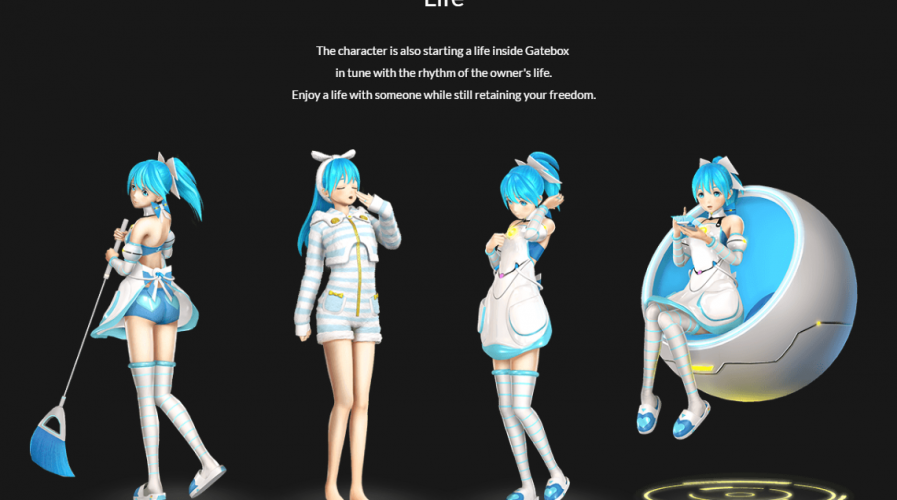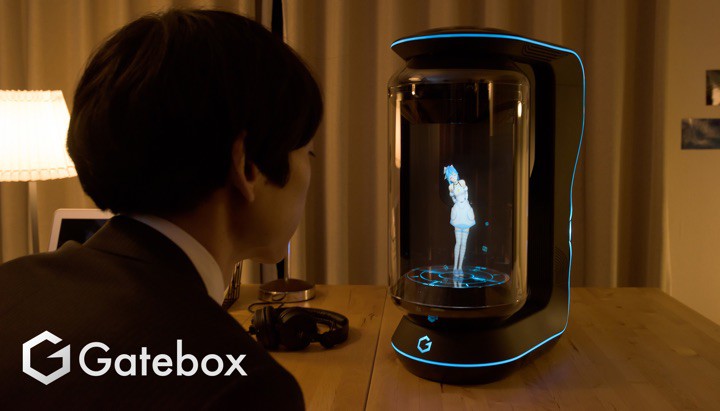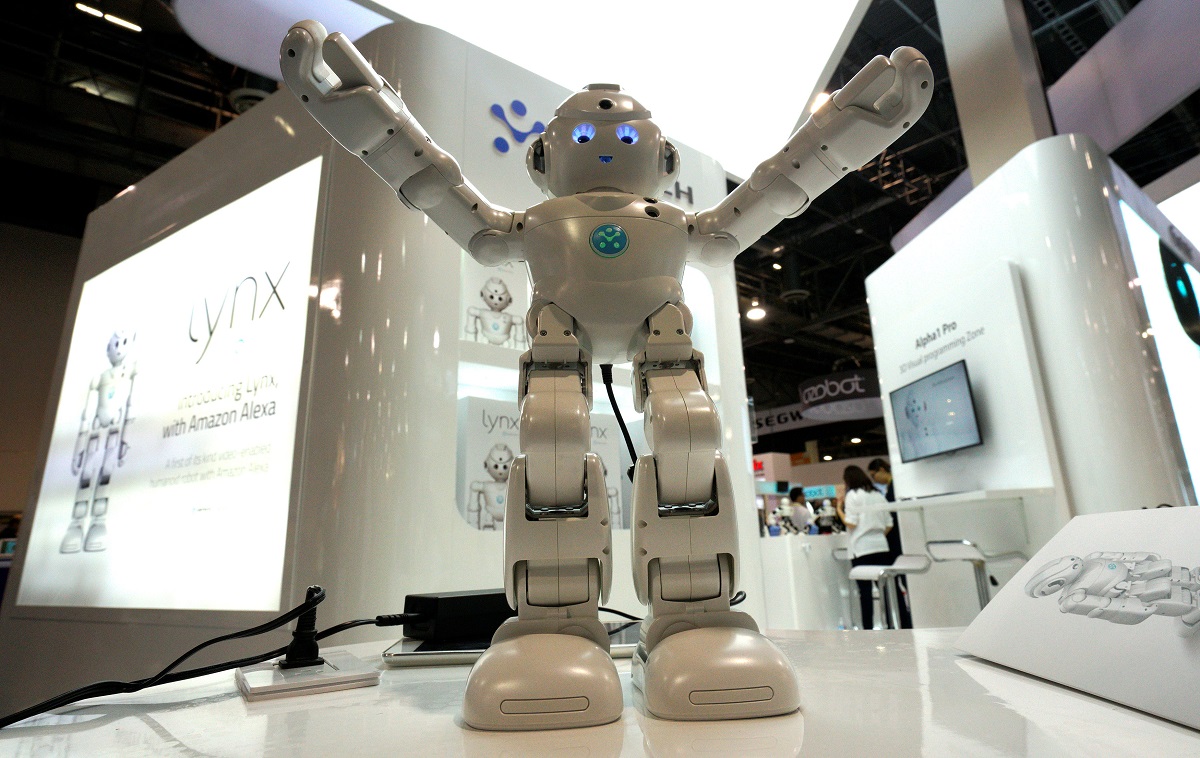
Hikari is the first character to be released by Gatebox. Source: Gatebox.ai
Vinclu’s Gatebox AI assistant wants to have a relationship with you
ARTIFICIAL intelligence is often charged as lacking emotion and humanity – that’s a perception Vinclu Inc. founder Minori Takechi is eager to challenge with Gatebox, a hologram digital assistant that encourages its owners to forge emotional relationships with it.
According to Takechi, Amazon’s Echo and Google Home are too disinterested in humanizing their virtual assistants, which are too focused on maintaining “inorganic and mechanical” identities profoundly disconnected with actual people.
“My vision is a world where people can share their daily lives with their favorite fictional characters,” Takechi, 29, was quoted saying by Bloomberg.
“We live in a time when all kinds of robots start making their way into our homes. But much of what you see now is inorganic and mechanical and I doubt people will want to communicate with something like that.”
Gatebox is roughly the size of a large thermos, and projects holograms in its interior. Bloomberg’s reporting of the device details an avatar, Hikari Azuma, a character in a miniskirt that bears many hallmarks of traditional Japanese anime characters.
Users can have basic conversations with her, or have her carry out simple tasks such as turning on the lights in the morning or welcoming you home after a long day of work.
SEE ALSO: Japan: Gatebox’s smart virtual reality ‘companion’ receives mixed responses
Vinclu’s Gatebox website describes Hikari as possessing “an ultimate healing voice” that will adjust her conversation depending on the time and day. The character can also be contacted via chat so that you can carry on your relationship without being together – but be wary of coming home too late, lest she gets lonely!
Gatebox is paired with LINE Corp.’s proprietary Clova AI platform, which the company got access to after the instant messaging company acquired a majority stake in Vinclu in March. Clova was developed by LINE and its South Korean parent company, Naver – the companies have been working on offerings to take on Amazon’s Alexa and Google’s Assistant via a series of AI-enabled devices, including a smart speaker called Wave.

Gatebox’s appeal might be confined to Japan, where robots and virtual characters are firmly embedded as natural parts of the culture. Source: Gatebox
“Combining Gatebox know-how and technology with our own Clova AI platform will allow us to develop a new kind of post-display, post-touch agent capable of making the lives of the users richer and more fun,” LINE’s chief strategy and marketing officerJun Masuda said.
LINE’s instant messaging app is wildly popular across East Asia and Southeast Asia, giving the company access to oodles of user information, which would be integral to the development of the AI software.
LINE isn’t the only company that is closely watching the company’s technological inventions. Way before Alexa and Google Home made their way into our everyday lives, Takechi was already pitching his idea to investors, who helped him raise JPY200 million – Primal Capital and Incubate Fund are some of the company’s investors. Vinclu has also won over Taizo Son (younger brother of Softbank head honcho Masayoshi Son), who is known for being interested in “unconventional startups”.
Early in the game, investors weren’t looking to back AI-hardware, but Takechi won over his investors with early sketches and a strategy to capture the hearts of customers with “kawaii”, or the Japanese concept of cuteness. According to Takechi, Vinclu’s strategy of leveraging on the undeniable adorability of the holographic characters will allow the technology to make mistakes without grating on users’ nerves too much.
“The kind of communication we are focusing on isn’t your typical command-answer relationship,” Takechi said.
“Kawaii is infallible.”
In context, Takechi’s strategy is a smart one. On the most basic level, there are three stages of artificial intelligence: weak, strong and super intelligence. Currently, most AI-powered research is based on weak AI that is highly dependent on algorithms and being fed large amounts of information selected by its researchers.
As such, the AI tends to be very specific to a single task, and usually quite binary in its abilities.

A Lynx robot with Amazon Alexa integration is on display at the Robotics Marketplace at CES. Source: Reuters
The kinds of robots that are able to learn by itself and form opinions tend to start around strong intelligence technologies. Super intelligence is where the SkyNets of the world start appearing.
Many AI researchers agree the odds of machine learning technology to arrive at strong intelligence – what more super intelligence – is highly unlikely in the near future. Takeshi’s attempts to create an AI with an attractive personality and appeals to emotions might just be a key ingredient to challenging Amazon and Google’s offerings, which he says have very narrow, utilitarian purposes.
SEE ALSO: SoftBank and Honda partner to create an intuitive car that talks using ‘Pepper’ tech
That being said, it’s highly unlikely Gatebox would appeal to customers outside Japan. Japanese society has an unusual affinity for robotics and the technologies that have begun to be embedded in daily life. Many restaurants are incorporating robot servers to make up for the shortfall of labor, while many robotic technologies have begun to be integrated as a part of the upcoming Olympics.
And of course, Japan has the dubious – and overstated, according to Bloomberg – reputation for odd anecdotes of unmarried men developing relationships with virtual girlfriends and sex dolls. Female anime characters have particular appeal for the unyoked male population, which is probably why Vinclu will offer a selection of avatars, which can include popular cartoon characters and sports idols.
Vinclu isn’t alone in its endeavor to matchmake the single masses with virtual loves – Japanese startup, Groove X Inc. is working on a robot that “touches your heart”.
READ MORE
- Safer Automation: How Sophic and Firmus Succeeded in Malaysia with MDEC’s Support
- Privilege granted, not gained: Intelligent authorization for enhanced infrastructure productivity
- Low-Code produces the Proof-of-Possibilities
- New Wearables Enable Staff to Work Faster and Safer
- Experts weigh in on Oracle’s departure from adland
